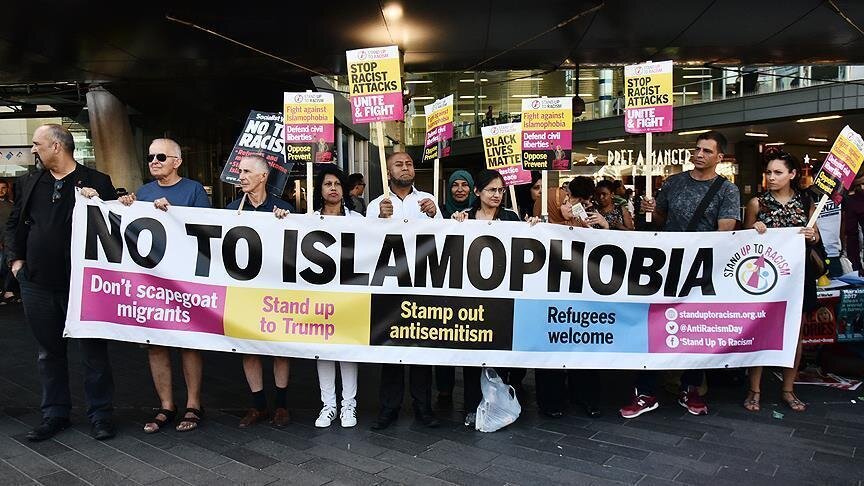British far-rightists vilify Muslims to divert attention from failures

MADRID - For over a week, the streets of the United Kingdom have witnessed unprecedented unrest led by far-right extremists. Cars were set ablaze, hotels and refugee shelters attacked, and local mosques became primary targets for the rioters. Now, it seems that calm has partially returned, and the disturbances have been somewhat contained, at least in England.
The chaos erupted following the horrific murder of three girls and the wounding of several others in a knife attack carried out by a 17-year-old during a children’s dance class on a quiet residential street in Southport on July 29. Public disturbances spread across the country, from the southwest to the northeast, transforming streets into battlegrounds between far-right extremists, police, immigrants, and local communities opposing the violence.
The attacker was falsely identified on social media by far-right profiles and fake news peddlers as a Muslim asylum seeker who had illegally arrived on a small boat. For some far-right agitators, a tipping point had been reached, prompting them to take to the streets.
Videos and posts from Tommy Robinson, former leader of the now-defunct English Defence League, whose X/Twitter account was reinstated last year by Elon Musk, were viewed an average of 54.3 million times daily between July 30 and August 9, according to the Centre for Countering Digital Hate.
So far, around 1,000 people have been arrested, with nearly 550 charged. Concern in the UK about the future is at an all-time high, with growing fears of what might happen with the expansion of fascism, xenophobia, and far-right extremism.
The ongoing normalization of far-right ideologies culminated in last week's events. Libraries and a Citizens Advice office were torched, properties destroyed, and people of color attacked. Meanwhile, Prime Minister Starmer issued ambiguous warnings, refusing to acknowledge that the riots were intended to terrorize Muslims and other vulnerable communities.
For years, the British Conservative governments have pushed an ultraconservative narrative that promotes policies against vulnerable groups and asylum seekers, marked by Islamophobia and a strong commitment to suppressing dissent. A clear example of this is Suella Braverman, the former Home Secretary, who labeled pro-Palestine protests as “hate marches,” thereby criminalizing demonstrators and their support for the Palestinians.
Another key figure in understanding the recent events in the UK is Nigel Farage, the quintessential face of British far-right populism. Farage described “some of the actions” of the far-right rioters as “truly disgusting,” but also appeared to justify the rioters, stating that it was “a reaction to fear, discomfort, and unease shared by tens of millions of people.”
Furthermore, Elon Musk, whose ties to fascist elements are undeniable, also played a significant role in amplifying the British far-right. Musk shared — and later deleted — a false post from the co-leader of the far-right party Britain First, claiming that the UK was building "detainment camps" for rioters. He even proclaimed that civil war in the country was "inevitable."
However, it’s important not to mistake this as solely the work of “ultra-radical” or populist voices. Too many people in positions of power have either denied the existence of Islamophobia for far too long or have actively encouraged it. Islamophobia can be defined as a form of racism that targets expressions of Muslim identity or any public display perceived as such.
In this context, it is crucial to understand that Islamophobia has become a global response to the public presence of Muslims, and as such, it is not exclusively the domain of extremist groups. "Respectable" groups, like the British Conservative Party, have been normalizing anti-Muslim racism for years. The examples of this normalization of hate speech are numerous: from Boris Johnson’s comparison of Muslim women to “letterboxes,” which led to a 375% increase in hate crimes against Muslim women, to former Culture Secretary Nadine Dorries retweeting messages from Tommy Robinson, a well-known far-right activist.
The negative portrayal of Muslims in British media cannot be ignored either, where stereotypes that contribute to the marginalization of these communities are regularly propagated. This has led to a third of the UK population endorsing prejudices such as "Islam is a religion of violence" or "Muslims will never be as British as other British people."
During the height of the Syrian refugee crisis in 2015, British media coverage was much more negative compared to other European countries. Dehumanizing terminology dominated the tabloids, which referred to refugees as an “influx,” “flood,” “hordes,” and “swarms.” Moreover, the media stoked fears by using military metaphors and war imagery, with headlines like "send in the army" to stop the "invasion."
As white nationalist mobs targeted Muslim communities this week, these media outlets became their megaphones, amplifying the intolerance. Some even suggested that Muslims should expect such behavior, while others promoted dangerous conspiracy theories about a supposed “Islamification” of society. In doing so, these media platforms normalized views that portray immigrants of color as a threat to British society and British Muslims as a “suspect community” blamed for the country’s problems.
British media and politicians have sown the seeds of this violent unrest, spending years vilifying and scapegoating Muslims to divert attention from policy failures and to garner votes and viewers. Unless these hateful narratives against Muslims are actively challenged and reversed, it is inevitable that these violent disturbances will recur.
culled from Tehran Times

